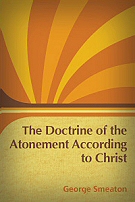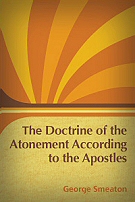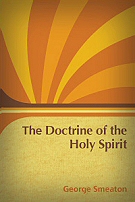Smeaton Theology Collection (3 vols.)
Digital Logos Edition
Overview
George Smeaton was an eminent Scottish theologian who contributed to a resurgence of Calvinism in nineteenth century Scotland. Along with James Buchanan and Horatius Bonar, Smeaton’s theological writings were intended to help Reformed churches rediscover the central doctrines of Calvinism. The continued popularity of Smeaton’s work more than a century after its first appearance testifies to his success and continued relevance for modern readers.
The 3-volume Smeaton Theology Collection contains two volumes on the atonement and one on the Holy Spirit. Smeaton combines solid exegesis with a careful examination of doctrinal history to produce works which remain as important in our day as they did in this. His thorough examination contains exegesis on every passage in the New Testament dealing with the atonement—a vital resource for the current debates over the atonement. This collection also contains Smeaton’s landmark work on the Holy Spirit, which deals with inspiration and revelation, regeneration and holiness, and a historical survey of pneumatology since the apostolic age.
This title is included in the following collections
You can save when you purchase this product as part of a collection.
Logos 6 Reformed Silver Legacy...
$349.99$349.99Reformed Theology Bundle (74 v...
$880.80$527.992025 Reformed Gold
$849.99$679.99Logos 6 Reformed Gold Legacy L...
$849.99$849.99
- $1,499.99$1,199.99
- $1,499.99
- $2,999.99$2,249.99
- $2,999.99
- $2,999.99
- $2,999.99
- $4,749.99$3,562.49
- $4,749.99
- $4,749.99
- $4,749.99
- $11,399.99
- $11,399.99
- $23,999.99$17,999.99

Key Features
- An examination of every passage in the New Testament dealing with the atonement
- A history of the work of the Spirit
- All Scripture references linked directly to the Bibles in your library
Praise for the Print Edition
Smeaton was an outstanding scholar with a brilliant mind and a deep love for Christ. . . . These great volumes should regularly be in the hands of every person who teaches and preaches the Gospel of Christ. They are treasure troves.
—Sinclair Ferguson in The Great Exchange
A valuable contribution to the literature of the doctrine of the atonement.
—Bibliotheca Sacra
One of the greatest works ever written on the Holy Spirit.
—Presbyterian and Reformed Review
Product Details
- Title: Smeaton Theology Collection (3 Vols.)
- Author: George Smeaton
- Publisher: T & T Clark
- Volumes: 3
- Pages: 1,456

The Doctrine of the Atonement, As Taught by Christ Himself deals with nearly every passage in the Gospels referring to the death of Christ. In this volume Smeaton examines parallel Bible texts in the Gospels of Matthew, Mark, Luke, and John, as well as passages in which Christ personally explains the nature, scope, and result of his death on behalf of mankind. The author presents Jesus' explanations of his death and resurrection as proof that God indeed forgives those sinners who trust in Him. His death as a substitution for the resolution of their personal sin is shown to be God's guarantee of redemption. Smeaton describes in depth these Gospel accounts in which Jesus offered insight into the divine view of the cross..

Thanks to George Smeaton's faithful use of his exceptional gifts as a theologian and exegete, The Doctrine of the Atonement, As Taught by the Apostles is a brilliant study, serving as both a doctrinal discourse on the atonement, and a treatise on the key passages in the New Testament. One of the features of this insightful book, which serves to make it so relevant and important to us today, is the author's examination and explanation of every passage of the Bible dealing with the atonement. A by-product of addressing each and every verse pertinent to the subject is that the book is redundant in a most effective way—delivering the same messages repeatedly from slightly different perspectives, thus enhancing, embellishing, and deepening the reader's understanding of the gospel. Smeaton’s comprehensive biblical approach to the doctrine of the atonement makes an important book for understanding a scriptural approach to the various theories of atonement, as well as a clear-headed overview of the issues surrounding the current debate over the atonement.

Taking a three-fold approach to The Doctrine of the Holy Spirit, Smeaton first examines scriptural testimony on the Holy Spirit. Next, he gives details on six aspects of the Holy Spirit: the perceived "personality" of the Holy Spirit; the Spirit's influence by revelation and inspiration; how the Holy Spirit brings about an individual's regeneration; the Spirit of holiness; and the Holy Spirit in the church. Finally, he concludes with a historical survey of the doctrine of the Holy Spirit from the apostolic age.
About George Smeaton
George Smeaton (1814–89) was ordained to the ministry of the Church of Scotland at Falkland (1839), and was among the numerous ministers who emerged in 1843 during the Disruption to form the Free Church of Scotland. He was appointed professor at the Free Church College in Aberdeen (1854), and later became Professor of Exegetical Theology at New College, Edinburgh (1857). Smeaton passed away on April 14th, 1889.
Reviews
3 ratings

Bentley Crawford
1/29/2014
This is a great collection made even more powerful in Logos. I posted a review at the link below.Tin
7/18/2013
Timothy C. Seal
7/15/2013